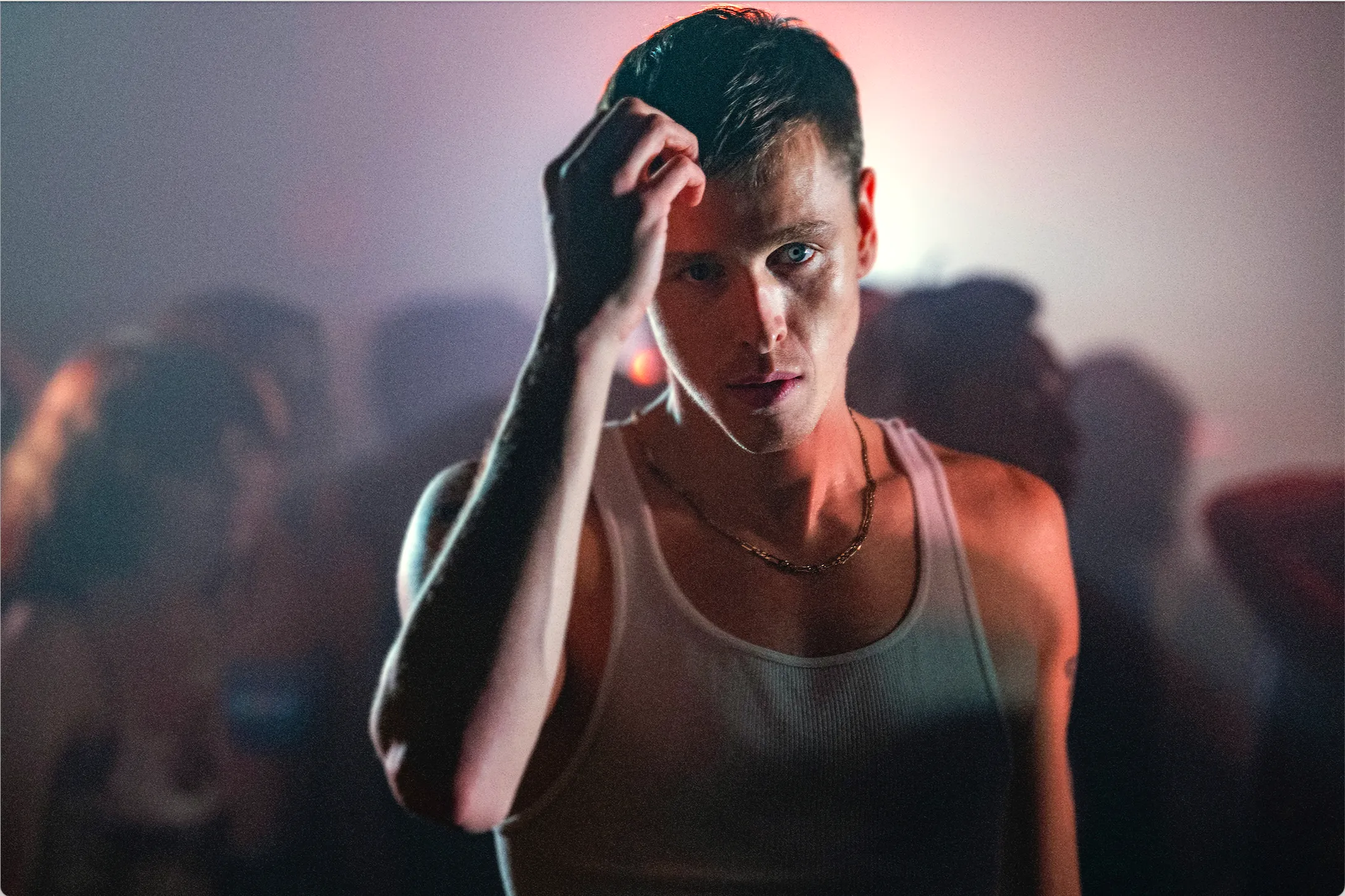How the actor is achieving stardom by channelling his powers of perception through a series of apparent airheads.
I still can’t decide where I stand on Halina Reijn’s Babygirl, which follows CEO Romy (Nicole Kidman) as she launches into a topsy-turvy Dom/Sub relationship with a company intern. Is it an enigmatic masterpiece which shrewdly defies sexual or psychological categorisation? Or is it a messy film which attempts to compensate for its lack of conviction with a sham visage of quasi-provocative imagery? I honestly couldn’t tell you.
However, one thing I am sure about is the irrepressible sex appeal of Harris Dickinson as Romy’s fresh-faced lover, Samuel. I am also not alone in this, as Babygirl has prompted more than a bit of online thirsting for the East London actor. Grazia has since crowned Dickinson “The Internet’s Boyfriend”, while Vulture has suggested now is the time he goes from “Anonymous Hunk to Onymous Hunk”.

Yes, Harris Dickinson has captured our horned-up zeitgeist and is now 2025’s first hunk-du-jour. This also brings the kind of cultural traction long enjoyed by fellow anglosphere actors like Josh O’Connor, Paul Mescal, and Jacob Elordi. It is fitting that Samuel’s chain in the film has received a lot of Connell-esque attention (Mescal’s character from Normal People).
However, something sets Dickinson apart from his peers who often reached stardom through the same swooning, dashing, or boy-next-door archetypes that have built countless actors stretching back to Hugh Grant or Colin Firth. It is not because he can’t do this, as was proven in his brilliant comedic turn as Richard Attenborough in See How They Run (2022), but because he has opted to play characters far harder to pin down or to invest in. Dickinson has mastered the art of playing the himbo.

Now, I certainly don’t mean himbo in its most kenergetic form. Rather, Dickinson has taken on characters who appear a bit airheaded and even played this up on their surface. This includes city-boy wannabees, aged-out models turned influencers, and stunted-man children. The sorts of people you might find clogging up your social media feed and would scroll past without hesitation. Yet, Dickinson either elegantly highlights their depths without spelling anything out, or interrogates their surface with such confidence and complexity as to craft characters with an elusive magnetism.
Take his debut in Eliza Hittman’s indie darling Beach Rats (2017), where he plays an aimless Brooklynite teenager who puts up a cool, unthinking façade but then struggles with his sexuality and yearns for a more fulfilled existence. Or his follow-up role in Postcards from London (2018), where he plays an aspiring actor recruited into a Soho band of Caravaggio-obsessed male escorts, and later becomes an artist’s muse and faints before beautiful paintings. It is a bizarre character to pull off, but Dickinson does it with ease. He perfectly intermingles superficiality with inquisitiveness to become both an object of desire and a desirer of knowledge.
In Scrapper (2023), he plays a young father, Jason, who is absent from most of his 12-year-old daughter Georgie’s life and only returns after her mother’s death. Jason is without question emotionally stunted and entirely dumbfounded by what it means to be a father. Dickinson also never plays him as anything but that and spends most of the time acting like Georgie’s wayward best friend. But it is in being that immature figure of a father that Jason somehow becomes the emotional bedrock Georgie needs.
His role in Ruben Östlund’s Triangle of Sadness (2022) also sounds fairly uncompelling as Carl, the model-influencer who blithely spends the film following around women more clued in and capable than himself. However, Dickinson weaves his character’s confusion and subservience so intricately that he becomes utterly compelling, as we watch Carl gleefully entangle himself up in a web of introverted social and gender dynamics.

In all cases, Dickinson combines an apparent air-headedness with acute social awareness to create characters which disarm and then get under the skin of each film. This is certainly also helped by his physical appearance, which combines innocent doughy eyes with model angular features into something sweet but striking.
It is also what makes him so attractive in Babygirl. Samuel disarms the audience with his lanky gait, ill-fitting non-corporate jackets (à la Greg from Succession), and his slow deliberate speech. On some level, he appears unaware of social conventions, which is why he speaks so brazenly to top boss Romy. However, there is a spark which suggests he is more a voyeur than a gawking spectator- even if he is not aware of this himself.
This is certainly true with Romy whom he quickly zeroes in on and tells she likes “being told what to do”. This knowledge is the base of their illicit affair as Samuel becomes what she desires, but does it so casually as to make one question what is conscious performance and what is natural allure.

Does Samuel know what he is doing when he strokes his tie with phallic-like sensuality? Is his much-memed dance scene a cringey attempt at foreplay, or a spur-of-the-moment feeling delivered so un-self-consciously as to become attractive? Is Samuel simply a good-looking boy genuinely unaware of his rare ability to find and perform somebody’s ticks for them? Or is he more of a Magic Mike dancer with psychoanalytical powers of perception?
Either way, it makes for a disorienting sea of pleasures. Audiences can simultaneously enjoy the puppy-dog enthusiasm of a young man pleasing his older woman and the more substantive, maybe even sinister, possibility of a shrewd social operator bending people to his whim.
None of this is classic leading man stuff, which still lends itself to grand gestures or poetic soliloquising. It will never be an attention-grabbing move to outwardly profess your character’s simplicity and camouflage their nuances. But it is what has made Harris Dickinson such a mercurial on-screen presence for so many years, and I am glad audiences are finally cottoning on to it.

